I suppose all of us are appalled at the destruction, loss of life and human misery in the current Hamas-Israel fighting.
I have refrained from commenting until now, because I really didn’t know what to say and how to have a just perspective.
But a few recent events, including the publicised deaths of entire families and the dire situation that seems to go on and on beyond any sense and reason, have led me to think harder about the roots of this merciless conflict.
In the following I have tried to present true facts from neutral sources before I offer any opinions. I have learned a lot from my research, and I hope you do too.
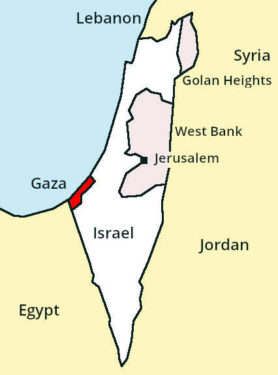
A little geography
The map shows the location of The Gaza Strip and Israel. Gaza is about 41 km long and 6-12 km wide. About 2 million people live there, mostly Palestinians, making it one of the most densely populated parts of the world.
Gaza and the West Bank (population 3.4 million) are known as the Palestinian Terrritories or the Occupied Territories. They were originally supposed to be Palestinian areas, but have been controlled by Israel since 1967.
Ownership of the part of the Golan Heights occupied by Israel (population 50 thousand) is disputed, with most countries seeing them as Syrian land occupied by Israel, while Israel and USA say they are part of Israel.
The population of Israel is about 9.6 million.
Horror upon horror
The gradual destruction of Gaza by the Israeli army over the past 9 months has directly led to the death of about 39,000 Palestinians with many more injured, the displacement of almost all residents and the collapse of most infrastructure and services. More than half of all Gaza’s buildings have been destroyed, and it is estimated that re-building will cost something like $50 billion.
The Israel blockade has limited the amount of water, food, medical supplies and temporary shelter entering Gaza. People have nowhere to go. Hospitals cannot cope, disease is a threat and starvation is close for many. Some experts say the indirect loss of life caused not by the fighting but due to disease, hunger, etc, may be several times the direct toll.
The United Nations (“This terrible war must end”) and many countries have condemned Israel’s actions and imposed sanctions.
But before we rush to judgment, let’s consider what led to the war.
More horror
Hamas (an acronym of Harakat al-Muqawama al-Islamiya, or “Islamic Resistance Movement”) is a Palestinian Islamist political and military movement established in 1987. In 2006 it won control of the government in Gaza. Throughout its history, Hamas has attacked Israel via suicide bombers and rocket attacks.
In October 2023 a Hamas attack into Israel brutally killed more than 1100 people, about two thirds civilians, with another 250 taken as hostages. The attack is consistent with some Hamas rhetoric over decades that its aim is the end of the Jewish state. (To be fair, sometimes Hamas has said it would accept a less severe outcome.)
Israel justified its subsequent fierce attack, saying: “We are fighting human animals and we are acting accordingly.” It’s avowed aim is to destroy Hamas. But with fighters and civilians living in close proximity, such an aim, even if possible, must inevitably lead to significant civilian casualties.
But before we rush to judgment, let’s consider what led Hamas to its attack.
75 years of unequal struggle
Since the establishment of the modern state of Israel in 1948, it has gradually enlarged its borders and imposed its authority on the Palestinian people.
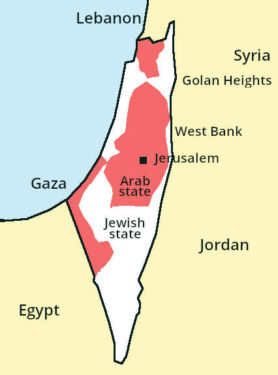
The original plan proposed by the UN was for a Jewish and an Arab state of more or less equal size to be established, as shown in the map.
However the Arab state was never established, and in the 75 years since, Israel has enlarged its borders and taken authority over the remaining Palestinian areas in Gaza and the West Bank, as well as the Golan Heights.
In that time, approximately 10 thousand Israelis and 50 thousand Palestinians have been killed and a significant proportion of Palestinians displaced on 3 main occasions (1948, 1967 & 2023/24).
On top of that, since the 1967 war when Israel occupied the West Bank (a Palestinian Territory) and the Golan Heights (part of Syria), Israel has been establishing settlements in these areas, often displacing Palestinians, and supporting the settlements militarily. The international community, including the International Court of Justice, considers these settlements to be illegal and should be removed, but Israel argues they are legal.
But before we rush to judgment, let’s consider what led to Israel’s actions.
Arab reactions to Israel
Arab leaders didn’t agree with the original UN proposal. Arab armies attacked Israel in 3 major conflicts, in 1948/49 (immediately after Israel was established as a state), 1967 (the Six Day War) and 1973 (the Yom Kippur War). Israel was victorious in each one, and in 1949 and 1967 these victories led to Israel enlarging its borders.
Israel has maintained that it must exercise control of the Palestinian Territories and the Golan Heights, otherwise it will be vulnerable to attack and guerilla activity.
Before we rush to judgment, let’s consider what led to the Arab response.
The establishment of Israel in 1948
At the beginning of the 20th century, Palestine was part of the Ottoman Empire, based around modern day Türkiye. But the Empire was in decline, and after World War I, in which the Empire sided with Germany, the Empire was divided up by the victorious allies.
Britain was given control of Palestine, which was simply an area of land, and not a nation, with the task of providing a home for both Jews and Arabs. But neither of these two groups was fully happy with the arrangement. Palestinian Arab nationalism was growing, as was Zionism, leading European Jews to start to move to Palestine in greater numbers, especially after the rise of Nazism in Germany.
Tensions increased between the two communities leading to growing confrontation and violence and the establishment of terrorist and paramilitary organisations. So Britain and the UN developed the planned solution of an Arab state and a Jewish state, but this proposal was rejected by the Arabs, who believed it was favourable to the Jews. They had a reasonable case.
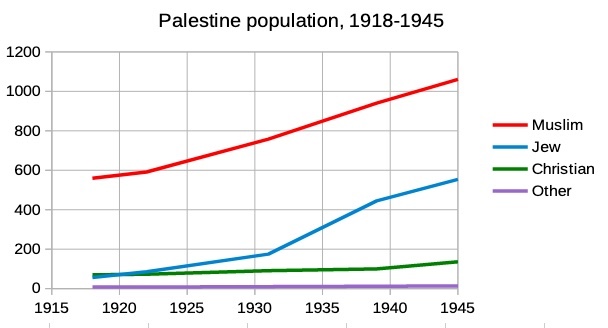
As shown in the graph, when the Ottoman Empire collapsed in 1918, Jews made up less than 10% of the population of Palestine. By 1945, large-scale Zionist immigration had increased that to more than 30%. Yet the UN partition proposal gave the Jews 56% of the land (though this included the less productive Negev region) and expected a third of the Arabs to live in the Jewish state.
The Jews publicly accepted the proposal, but made plans to enlarge their territory as soon as the British left. After the war with surrounding Arab nations, Israel ended up with 67% of the land, while 700,000 Palerinian Arabs had become displaced refugees. The UN tried to bring order and justice to this situation, but their mediator was assassinated by a Jewish terrorist group. I don’t know how much this dishonesty and violence was supported by mainstream Jews, but the whole nation benefitted.
The messy and unequal situation has remained to this day.
Ancient history?
The Jewish claim to Palestine goes back more than 2 millennia. According to the Bible, God promised the Israelites the land of Canaan, and Joshua conquered the land in a bloody campaign against a bunch of Canaanite cities and tribes somewhere in the period of the 15th to the 13th century BCE.
Archaeology and history throw considerable doubt on the extent of that “conquest” – it seems more likely that the nation of Israel grew out of a small group emigrating from Egypt assimilating with the local Canaanite peoples and fighting with some of them until a new nation was born – but in any case this is Israel’s foundation story that Jewish claims to the land are based on.
Despite being conquered, exiled and occupied by successive neighbouring nations, there was still a visible Jewish nation in the time of Jesus, albeit occupied and divided up by the Romans. But when Jewish nationalists rebelled against Rome in 67-70 CE and 135 CE, the temple was destroyed and the Jews scattered. The Jews were now a minority in what they saw as their own land.
For the next 1800 years, Jewish people were spread over Eastern and Western Europe and various parts of the Middle East, often discriminated against. By the late 1800s there were 5 million Jews in the Russian Empire, experiencing discrimination and poverty, and many of them fled to USA and Europe. The Zionist movement sought to end the persecution and return Jews to their traditional homeland. Hitler’s genocide in the Holocaust strengthened this movement.
The UN chose to recognise the Jewish aspirations with the establishment of a Jewish nation.
An intractable problem?
Note: here I shift from facts to personal opinions.
It is easy to see how the Jews felt after this history. It is also easy to see how the Palestinian Arabs felt about being pushed aside. Both groups have legitimate rights and expectations that are in direct competition.
But we can see so many wrongs as well. The Zionist Jews seem to have never been willing to share the land with the Palestinian Arabs, and willing to go to any lengths to achieve their goal. The Arabs were likewise unwilling to share the land. The United Nations and the western European “great powers” seemed to favour the Jews and be unwilling to enforce UN decisions.
As a result, fighting over 75 years has led to uneven loss of life – five times as many Palestinians as Jews. That disdain for human life on both sides can be seen in the recent events.
Christians in the west have tended to support Israel, in the belief that this is a fulfilment of God’s promises to the Israelites. I am sceptical about that, but let’s run with it for a moment. The Old Testament prophets warned again and again that Israel had lost its independence and would lose its land if it was unfaithful. It is hard to see that modern Israel, in the main a secular state, is faithful to God in that sense, so it is hard to see how modern day Israel can be seen as prophetic fulfilment.
Could it ever be different?
It is said that the Middle East has an “honour-shame” culture, where preserving honour and avoiding shame are strong behavioural motivations that often lead to revenge and a spiral of violence. We can see this in the Palestinian-Israel situation.
Hamas knows that any attack on Israel will lead to reprisals, likely resulting in many times more Palestinian deaths than they inflict on Israel, and these attacks are ineffective in changing the situation, yet honour requires them to act anyway.
Israel knows that while its reprisals can more than avenge Hamas attacks – which is contrary to their own scriptures which require “an eye for an eye” and no more (Exodus 21:24; Leviticus 24:20) – the reprisals will only lead to further attacks. Israel may win the body count, but Israeli citizens still lose their lives.
Israel seems implacably insistent on taking over the West Bank Palestinian territories, disregarding Palestinian rights and squeezing them into small areas like Gaza which are unviable in the long term. These repressive actions are said to be justified as responses to Palestinian threats, and Hamas plays into their hands. The ordinary Palestinian people are pawns in their games.
Hundreds of thousands of people who haven’t lifted a finger against Israel are unimaginably suffering.
There is another way
Israel should know better. Two millennia ago, one of their own prophets, Jesus of Nazareth, urged his fellow Jews to replace an honour-shame culture with an ethic built on grace (Matthew 5:43-44), forgiveness instead of revenge (Matthew 6:14-15), and non-violence (Matthew 5:38-39).
If only the Zionists had recognised that it was a grace, not a right, that they could return to their traditional homeland.
(Where else has such a return to ancestral lands been allowed? Not in colonised countries like the Americas, Australia and South Africa. Not in Britain where the Celts haven’t been given the land taken off them by waves of Romans, Vikings, Anglo Saxons, and Normans. Not in Tibet.)
Had they taken a different view, things might have turned out differently. Yet even today, Israeli responses to criticisms of their disregard for civilian life reflect their claim that the land is theirs by right.
And if Palestinian miltants could recognise that sharing the land would in the long run be better for the long-suffering Palestinian people, they might achieve more than senseless loss of life.
I’m not holding my breath
But practically (and sadly), I don’t suppose it’s going to happen any time soon. Both Israel and Hamas seem to be locked into to a cycle that prevents toning down rhetoric and actions. Neither seems willing, or even able, to give the slightest ground, but until they both do, the same senseless confrontation will continue.
And so no-one comes out of this well. Not the ‘great powers” that make decisions on behalf of others. Not Israel that seems so focused on its own agendas that it can ignore the suffering it inflicts. Not Hamas, that pursues ineffective and destructive strategies. And not western Christians who blindly support Israel despite everything, and seem oblivious to justice.
One clear truth
The Palestinian people deserve better (= just) treatment by Israel, Hamas and the world. Lord, have mercy!
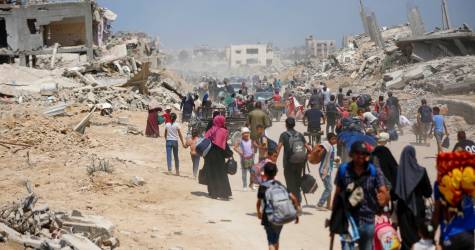
Top photo by Palestinian News & Information Agency (Wafa) in contract with APAimages, CC BY-SA 3.0, via Wikipedia.
Bottom photo: Families forced to flee Khan Younis following evacuation orders from the Israeli Authorities, 22 July 2024, southern Gaza Strip. (United Nations Relief and Works Agency for Palestinian refugees in then near east).
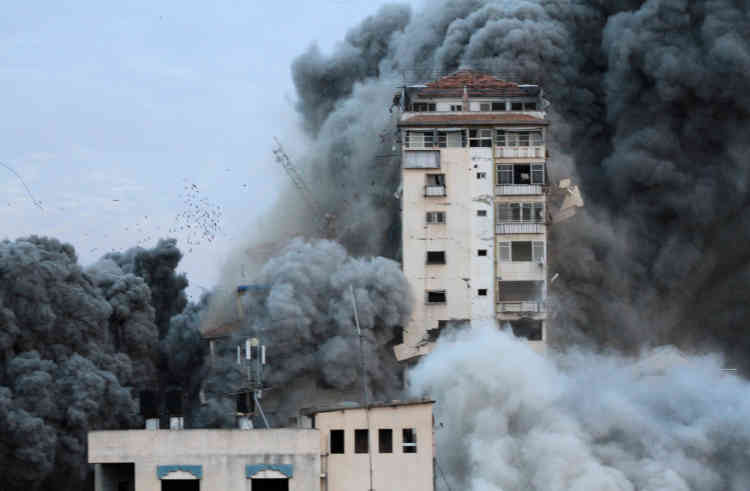




Very well put.
People such as myself with no “skin in the game” can’t just pluck solutions out of the air without an understanding of the deep emotions on both sides, but the only solution I can see is an “independent” peace keeping force in the area under the auspices of the UN. That will never happen though because there will always be arguments about which country is independent of both sides. Virtually no country is and those that are don’t have sufficient military clout.
I’m afraid it looks as though the current Israeli strategy is “genocide” maybe based on religious teachings, if so it all may end in a regional affray with superpower involvement and will be even worse than it is now.
Thanks, and yes. But I think Israel has lost a few friends or sympathisers through this latest reaction.
Understatement of the year!